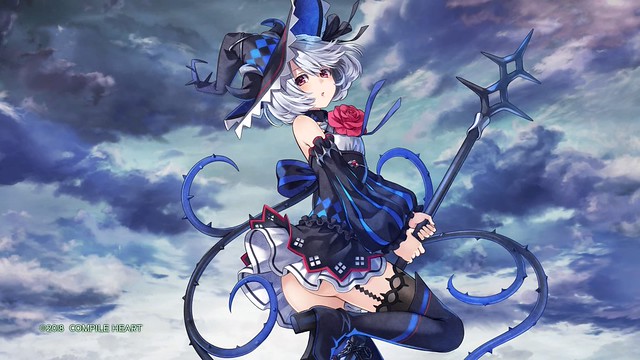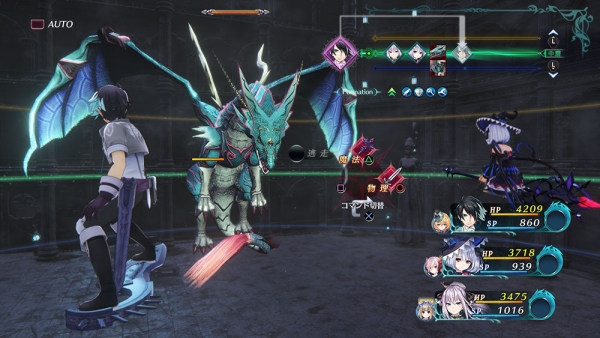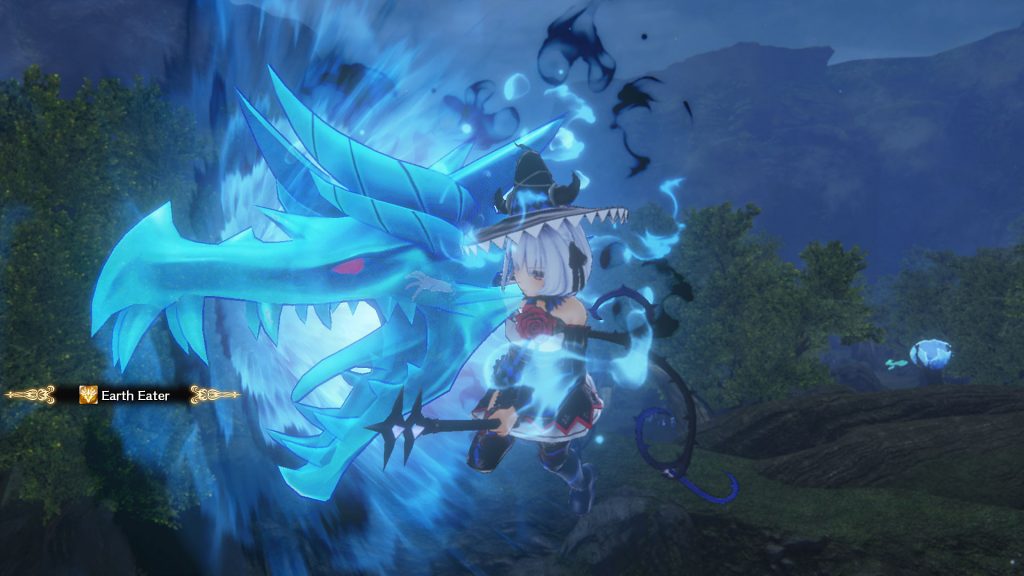It is traditionally agreed by critics and writers that keeping a consistent tone throughout a story is crucial to communicating the story’s key points. If your story flits wildly between comedy and tragedy, between absurdity and sense, then you’ll probably lose your audience. The best way to move between tones is to do so gradually, more of a gentle hike than a rollercoaster.
This is a point worth bearing in mind as we consider Dragon Star Varnir. This game comes to us from the combo of Idea Factory and Compile Heart under the latter studio’s Galapagos label. You might recognise the label from games like Fairy Fencer F and Death end re;Quest (they’ve got some intriguing naming conventions at Compile Heart, it must be said).
For their latest, the two studios have concocted something that wears its darkness on its sleeve. Dragon Star Varnir follows the adventures of Zephy, who’s branded a witch after encountering a dragon. Being branded a witch in this universe is, like in the real world, not good. In fact, it’s a death sentence. Witches in Dragon Star Varnir birth dragons, so the “Knights of Requiem” hunt them regularly.
It’s not all doom and gloom. Zephy meets a witch called Charlotta who may represent a way out for him and his kind. Charlotta thinks she’s found a way to free witches from the burden of birthing dragons, thus enabling them to live among the populace without fear of persecution. Zephy must help Charlotta find a solution to their problem, evading the Knights of Requiem along the way.
The reason I bring up the tonal inconsistencies is that Dragon Star Varnir rather wants to have its cake and eat it. On the one hand, its visuals tell the story of a fluffy anime yarn about cutesy kids, with all the usual “that guy’s 22 and he’s too old” problems. On the other hand, the themes and central narrative of the game are inarguably dark and bleak. These two truths create a jarring clash that never quite resolves itself.
It’s testament to the quality of Dragon Star Varnir that this problem never threatens to overwhelm the game. I enjoyed my time with Varnir immensely. Its characters are likeable and human (if a tad overdesigned in certain areas), its dilemmas are emotionally engaging, and its twists, turns, and resolutions are satisfying. I left the game feeling won over despite initial skepticism.
Varnir is a fairly conventional JRPG in terms of its core gameplay loop. You’ll explore dungeons, fight bosses, and craft items, all in service of a central combat system that emphasises character growth. These systems are all robust enough, linking together to create a game in which every aspect successfully manages to complement every other aspect. It’s rare to see a game so holistic in its approach.
With that said, each system by itself isn’t particularly compelling. Combat consists of a strange “layer” system, which sees characters moving around the battlefield vertically to cast spells depending on positioning. It’s a system that never quite feels natural or intuitive, and although the difficulty here is consistent, I never felt like I was getting to grips with the combat in the way I have with other Compile Heart games.
Still, the combat is fair, and it does allow you to gather materials for the crafting systems, which are well-rounded and fully-featured. There are quests to complete, too, and you’ll need to take time outside of the main story to devote your attention to them. They’re usually worth doing, although they can be quite oblique (some quests will ask you to find items which don’t regularly drop from enemies, which is always a frustration).
The character progression system in Dragon Star Varnir is one of its main strengths. When you defeat dragons, you’ll be able to Devour their cores. Each core grants different boons to characters, allowing you to shape your party. You can build an all-offensive team of mages or a support team consisting of buffs and debuffs; there’s a lot of freedom in terms of customisation.
The biggest problem with Dragon Star Varnir is also its biggest selling point. Minor spoilers here, so look away if you don’t want to know anything about the game. Remember when I mentioned the witches-birthing-dragons narrative point? Compile Heart and Idea Factory have actually implemented that feature into the gameplay. Dragon Star Varnir actually has a soft time limit.
On the one hand, this is undeniably an effective way of telling a story. Making the player feel every second of time they’re wasting as their witches move ever closer to their inevitable end is a great way to lend tension to the game. On the other hand, several of the game’s systems become almost redundant thanks to the time limit. You won’t be able to craft, do quests, or explore as much as you’d like.
This has several ramifications. If you haven’t quite spent enough time grinding to level up a character you want, you won’t be able to return and re-invest your time. Additionally, there just isn’t enough time in the game to complete all quests and craft items satisfactorily. If you’ve ever played Persona, imagine the time restriction of that game but amplified tenfold.
Still, Dragon Star Varnir is more than good enough to compensate for that flaw. The time limit is frustrating and counter-intuitive, but the crafting, combat, and engaging characters all make up for it. Expect to hit several brick walls here, but if you’re looking for a genuinely fresh and interesting JRPG, you may well have found it in Idea Factory and Compile Heart’s latest curio.
Purchase Now.
This post didnt have a specific author and was published by PS4 Home.




